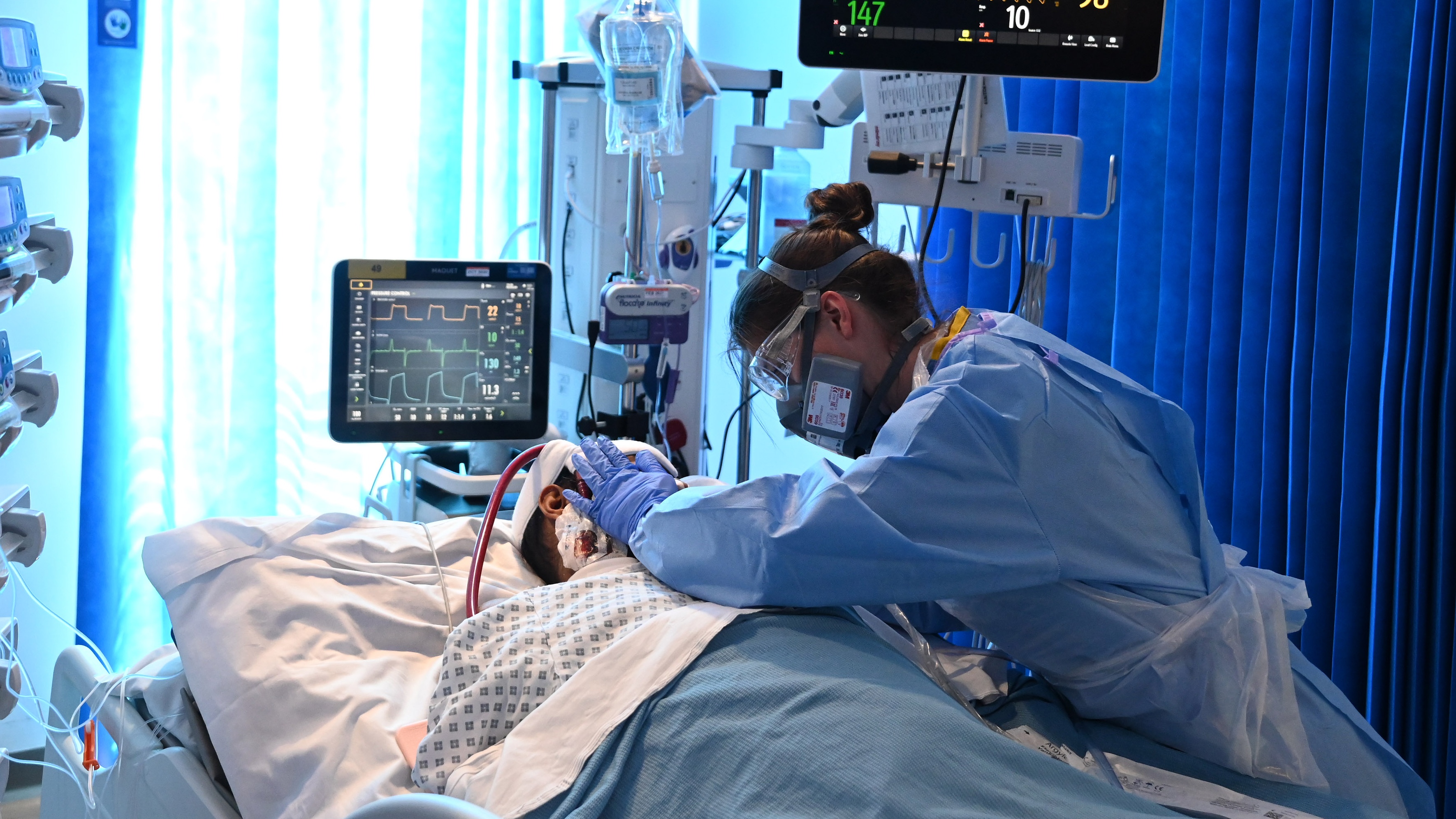How an inhaled drug could stop Covid’s most severe symptoms
Multiple sclerosis treatment could be repurposed to cut serious respiratory problems

A free daily email with the biggest news stories of the day – and the best features from TheWeek.com
You are now subscribed
Your newsletter sign-up was successful
A major trial of a drug which could stop Covid-19 patients from developing serious respiratory problems is giving hope that infections could become more treatable in the future.
The treatment involves inhaling a protein called interferon beta, which the body produces when it gets a viral infection, and is being studied in a mass trial overseen by the University of Southampton.
Early findings published in The Lancet last year suggested the treatment, developed at Southampton University Hospital and produced by Southampton-based biotech company Synairgen, cut the odds of a Covid patient developing severe disease by almost 80%.
The Week
Escape your echo chamber. Get the facts behind the news, plus analysis from multiple perspectives.

Sign up for The Week's Free Newsletters
From our morning news briefing to a weekly Good News Newsletter, get the best of The Week delivered directly to your inbox.
From our morning news briefing to a weekly Good News Newsletter, get the best of The Week delivered directly to your inbox.
How does it work?
Interferon beta, which is regularly used in the treatment of multiple sclerosis, is part of the body’s first natural line of defence against viruses, warning it to expect a viral attack.
Experts believe that Covid-19 blocks the production of interferon beta as part of its strategy to evade our immune systems. However, the new treatment sees it delivered directly into the airways via a nebuliser that makes the protein into an aerosol.
It is hoped that a direct dose of the protein in the lungs will trigger a strong anti-viral response. The Lancet study found that patients given interferon beta were not only less likely to develop severe respiratory problems, but that even patients who had already developed serious breathing problems were twice as likely to recover fully over a 16-day treatment period.
A free daily email with the biggest news stories of the day – and the best features from TheWeek.com
What next?
Writing on The Conversation, Gordon Dent, a senior lecturer in pharmacology at Keele University, says that “these results need to be confirmed in larger studies comparing the drug with other treatments”, adding that the drug’s efficacy is also being “investigated in combination with other therapies, including remdesivir”.
The team running the trial, which includes 600 patients in 20 countries, say they hope it will be completed by early summer.
Tom Wilkinson, professor of respiratory medicine at the University of Southampton, said: “If we had a positive study, we would hope to move rapidly into scaled manufacture and delivery of the drug in clinical practice.”
Chas Newkey-Burden has been part of The Week Digital team for more than a decade and a journalist for 25 years, starting out on the irreverent football weekly 90 Minutes, before moving to lifestyle magazines Loaded and Attitude. He was a columnist for The Big Issue and landed a world exclusive with David Beckham that became the weekly magazine’s bestselling issue. He now writes regularly for The Guardian, The Telegraph, The Independent, Metro, FourFourTwo and the i new site. He is also the author of a number of non-fiction books.
-
 Why are election experts taking Trump’s midterm threats seriously?
Why are election experts taking Trump’s midterm threats seriously?IN THE SPOTLIGHT As the president muses about polling place deployments and a centralized electoral system aimed at one-party control, lawmakers are taking this administration at its word
-
 ‘Restaurateurs have become millionaires’
‘Restaurateurs have become millionaires’Instant Opinion Opinion, comment and editorials of the day
-
 Earth is rapidly approaching a ‘hothouse’ trajectory of warming
Earth is rapidly approaching a ‘hothouse’ trajectory of warmingThe explainer It may become impossible to fix
-
 A Nipah virus outbreak in India has brought back Covid-era surveillance
A Nipah virus outbreak in India has brought back Covid-era surveillanceUnder the radar The disease can spread through animals and humans
-
 Covid-19 mRNA vaccines could help fight cancer
Covid-19 mRNA vaccines could help fight cancerUnder the radar They boost the immune system
-
 The new Stratus Covid strain – and why it’s on the rise
The new Stratus Covid strain – and why it’s on the riseThe Explainer ‘No evidence’ new variant is more dangerous or that vaccines won’t work against it, say UK health experts
-
 RFK Jr. vaccine panel advises restricting MMRV shot
RFK Jr. vaccine panel advises restricting MMRV shotSpeed Read The committee voted to restrict access to a childhood vaccine against chickenpox
-
 RFK Jr. scraps Covid shots for pregnant women, kids
RFK Jr. scraps Covid shots for pregnant women, kidsSpeed Read The Health Secretary announced a policy change without informing CDC officials
-
 New FDA chiefs limit Covid-19 shots to elderly, sick
New FDA chiefs limit Covid-19 shots to elderly, sickspeed read The FDA set stricter approval standards for booster shots
-
 RFK Jr.: A new plan for sabotaging vaccines
RFK Jr.: A new plan for sabotaging vaccinesFeature The Health Secretary announced changes to vaccine testing and asks Americans to 'do your own research'
-
 Five years on: How Covid changed everything
Five years on: How Covid changed everythingFeature We seem to have collectively forgotten Covid’s horrors, but they have completely reshaped politics